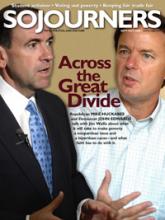Line up the few hundred thousand students currently attending North American Christian colleges. Look for the few sets of eyes that––in an unnerving, hopeful, mischievous way––carry a certain gleam. A glint that says: Jesus is real, radical, and in his name I’m here to rouse a little rabble.
Meet the student activists of the Millennial Generation (those born after 1985). They’re looking up from their schoolbooks and scrutinizing their campuses, considering the economic and social complexities of cleaning-staff wages, the origins of cafeteria food, the destinations of alumni gifts.
They also want to talk. By and large they are trading-in bombastic protests and bullhorns for a place at the decision-making tables of their administrations, anxious to join in the important conversations and help steer the direction of their universities.
“The Millennial student generation, in general, seems to want to work as partners with the administration and be a part of the system, instead of having a significant separatist mind-set that is ‘us against them,’” says Brian Cole, a doctoral candidate at Western Michigan University who is researching contemporary student activism. “These students now seem to want to have a place at the table where the decisions are being made, and do it a little more civilly.”
COLE IS CONTRASTING the placard-waving, chaining-oneself-to-a-tree activism of past eras with what he calls a more “conversational” tone. He is referring to students like Dan Leonard and Sarah Frymoyer, who graduated from Eastern University having helped to mobilize student interest in Darfur and successfully press the administration for fair trade coffee in the cafeteria and café.
Read the Full Article
